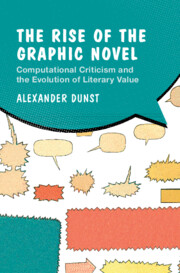Book contents
- The Rise of the Graphic Novel
- Cambridge Studies in Graphic Narratives
- The Rise of the Graphic Novel
- Copyright page
- Contents
- Figures
- Tables
- Preface
- Chapter 1 Introduction
- Chapter 2 How We Read Comics Now
- Chapter 3 Time, Color, and Cultural Capital in Graphic Narrative
- Chapter 4 Novel Values
- Chapter 5 The Social Imagination of Graphic Narrative
- Chapter 6 Conclusion
- Appendix: List of Titles in the Graphic Narrative Corpus (GNC)
- Notes
- Bibliography
- Index
Chapter 1 - Introduction
Computational Criticism and the Transformation of Comics
Published online by Cambridge University Press: 06 July 2023
- The Rise of the Graphic Novel
- Cambridge Studies in Graphic Narratives
- The Rise of the Graphic Novel
- Copyright page
- Contents
- Figures
- Tables
- Preface
- Chapter 1 Introduction
- Chapter 2 How We Read Comics Now
- Chapter 3 Time, Color, and Cultural Capital in Graphic Narrative
- Chapter 4 Novel Values
- Chapter 5 The Social Imagination of Graphic Narrative
- Chapter 6 Conclusion
- Appendix: List of Titles in the Graphic Narrative Corpus (GNC)
- Notes
- Bibliography
- Index
Summary
The Introduction begins by considering two dominant critical approaches to the graphic novel. While prominent authors have denied the relevance of the concept, instead preferring the term comics, many scholars have sought to align the graphic novel with prestigious literature. The chapter identifies the practical and institutional resources that the term provides, tracing the evolution of book-length comics under this mantle. Section 1.1 considers the relevance of Ian Watt’s The Rise of the Novel for understanding the graphic novel and puts forward a new periodization of the latter. The first cycle, lasting from 1980 to 2000, centers on the book for the first time in US comics history. Starting in the early 2000s, integration into the literary marketplace initiates a second cycle that effects several important changes, from an increase in the use of color to a diversification of visual styles. Engaging with recent work in cultural sociology and political economy, Section 1.2 situates the aesthetic evolution of the graphic novel in the ongoing transformation of contemporary society.
Keywords
- Type
- Chapter
- Information
- The Rise of the Graphic NovelComputational Criticism and the Evolution of Literary Value, pp. 1 - 25Publisher: Cambridge University PressPrint publication year: 2023



